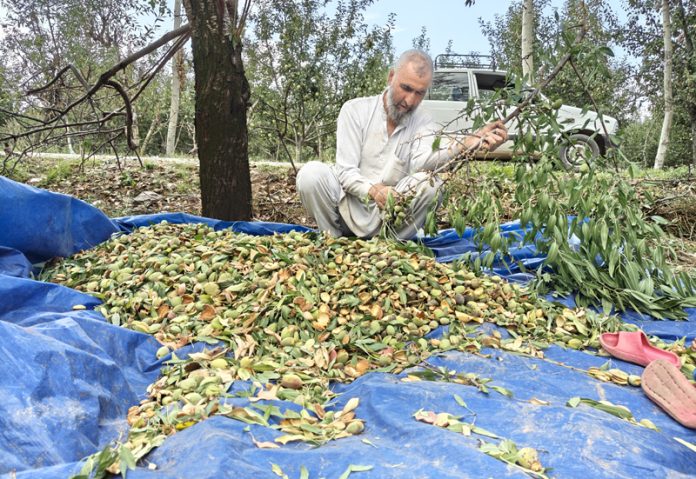Suhail Bhat
Srinagar, Aug 20 : Almond production in South Kashmir’s Pulwama district has significantly declined as farmers increasingly switch to apple cultivation, which offers higher profitability.
Over the years, the land dedicated to almond cultivation has drastically shrunk due to the widespread felling of almond trees and the conversion of almond orchards into apple orchards.
Farmers blame the Horticulture Department’s failure to introduce high-yielding almond varieties as a major reason for this shift. They contend that the department provides ample attention and better marketing support to apples, but neglects almonds, resulting in higher returns from apple production.
Pulwama once had the largest area under almond cultivation, but many farmers have now transitioned to apple farming, while others have abandoned fruit cultivation entirely. Areas such as Wahibug, Ruhmoo, Newa and Koel are the most affected, where growers are uprooting almond trees at an alarming rate.
Altaf Ahmad, a resident of Wahibug who switched to apple farming after struggling to sell his almonds, said, “The department barely supports almond growers. All the focus is on apples. The income from almonds is far less than what we invest. There is no proper market for local almonds, and the department has not introduced any high-yielding plants that could improve almond quality,” he said.
He also noted that the lack of expert guidance and poor marketing strategies have crippled the almond industry. “Experts rarely visit our orchards, and there is no proper marketing for almonds. We do not even have a single almond mandi in Kashmir,” he said.
Chief Horticulture Officer Pulwama, Javeed Ahmad, acknowledged that while the department has launched a scheme for high-density almond plantations, it will take at least a year to see results due to a shortage of planting materials. “Our almond industry has been hit hard by free trade agreements, as our almonds struggle to compete in the market due to inconsistent sizing,” he explained.
He added that, besides introducing new almond varieties, the department regularly monitors orchards and provides expert advice to farmers. On the issue of widespread conversion to apple farming, he said, “Apple is the most profitable cash crop, and with the introduction of high-yielding varieties, farmers are opting for apples purely for better returns,” he said.


